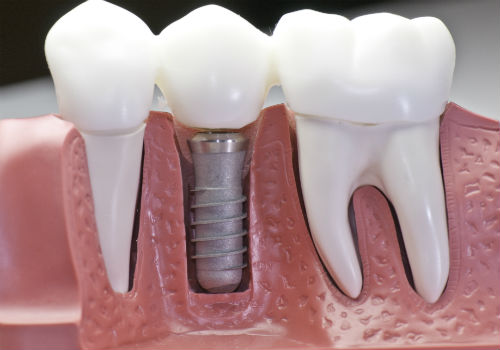If a patient has one or more missing teeth, your dentist may recommend a dental implant. Missing teeth can cause future dental issues, so dentists typically recommend filling the gap as soon as possible to restore your smile and full functionality.
Dental implants are fused to your jawbone and create stability for artificial teeth. Dentures, crowns, and bridges can be mounted on top of the implant, making them look and feel more natural than a fixed bridge or a removable partial denture.

What is a dental implant?
Dental implants are small biocompatible screws that mimic tooth roots and restore and reverse bone loss in your jaw. Implants fuse with the surrounding jawbone to create a sturdy base to support one or more crowns.
Once the site has healed in about three to six months, your dentist will cement your new crown in place.
After tooth extractions
The most common reason you may need a dental bone graft is to prevent bone loss after tooth extraction. This specific type of graft is called a socket graft because the graft material is inserted into the empty socket left behind by the tooth.
Your body allows resorption of the bone if it does not receive daily stimulation by an existing tooth or dental implant. Most of this resorption happens within three to six months post tooth removal. This can cause that space to shrink and alter your features.
Not all tooth extractions need bone grafts, however many of them do, especially if you have an excess amount of soft tissue missing, caused by gum disease.
Other reasons bone grafts are needed
If your jawbone cannot support the implant, the surgery may fail, so your dentist may recommend a bone graft before dental implant surgery.
There are several reasons why your bone structure cannot support an implant:
- Certain genetic or development defects may cause your bones to be weak.
- Untreated gum disease can cause the gum tissues not to stabilize future implants.
- After losing a tooth, the socket became infected or is too small for an implant.
- A past physical injury to your jaw can also affect the surrounding bones and tissues.
Am I a Candidate for Dental Implants?
There are a few reasons why you may not be a candidate for dental implants, the best way to determine if you are is to talk to your dentist about your options.
If you have received radiation treatments for certain cancers in the past, it may be difficult getting dental implants. Chemotherapy affects your body’s ability to bond with the implant and can complicate the healing process.
Heart disease can also complicate getting dental implants. This is because certain medications used as blood thinners can cause complications during the implant process.
What Happens During a Bone Graft Procedure?

During a bone graft procedure, the surgeon will take a small section of bone from another area in your body or use a special bone grafting material and place it onto your jawbone. After a few months, they fuse together to create a strong bone that will be sturdy enough for an implant.
During this process, you may have several check-up appointments with your dentist to ensure the area is healing properly. Once the site has healed your dentist will proceed with the implant surgery.
Conclusion
Dental implants are an excellent way to preserve your natural tooth structure. If you take proper care of the dental implant, it can last forever. Unlike a fixed bridge and a removable partial denture which may need to be replaced every few years due to wear and tear. Investing in affordable dental implants can give you a healthy and aesthetic looking smile.



